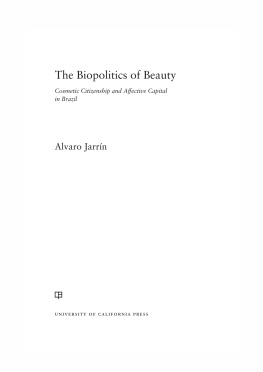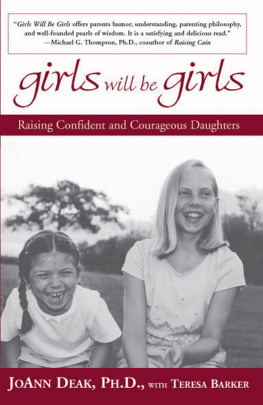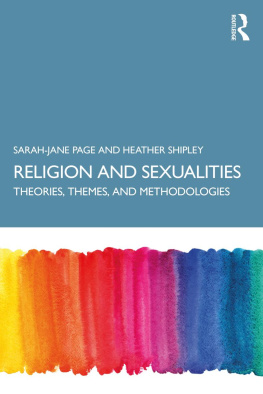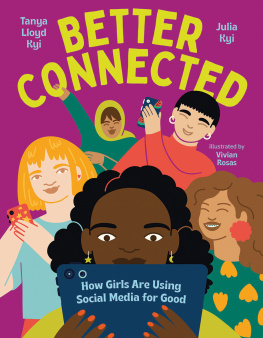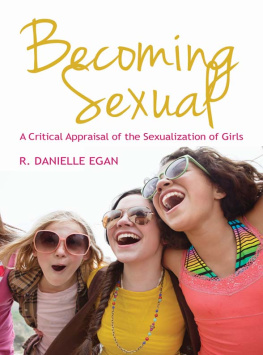Acknowledgments
It is impossible to put into words how many people have helped me along the winding road of writing this book. In many ways, this book is not solely mine but has depended on the labor and care of others, who made the research possible in the first place and who were there for me during the long research and writing process.
I thank all the people in Brazil who were willing to befriend me, spend some time talking to a young anthropologist, and provide me with a glimpse into their lives, hopes, and struggles. This book would have been impossible without their patient collaboration, and I hope I have done justice to their stories and their commitment to beauty. I am also thankful for the academic interlocutors who were willing to provide me with a host institution at which to present my work, especially the scholars who were part of the Programa Avanado de Cultura Contempornea at UFRJ, and those who participated in the Laboratrio de Etnografia e Estudos de Comunicao, Cultura e Cognio at UFF.
My fieldwork buddies, Beatriz Rodriguez Balanta, Lucia Cantero, and Bryan Pitts, have not only been partners in crime in Rio de Janeiro and So Paulo but have also helped me think through many of the issues this book addresses. The panels we put together, the papers we cowrote, and the feedback we gave on each others work have been central to my understanding of Brazils ongoing inequalities and political upheavals.
I am grateful for the generous intellectual community at Duke University that cultivated this project in its initial stages, and for the lasting friendships that have provided continuous support and feedback during more than a decade of research and writing. Anne Allison, Diane Nelson, and Rebecca Stein have been incredibly dedicated mentors throughout the whole process, especially during the grueling job search that eventually provided me with the financial stability to write. Margot Weiss and Leigh Campoamor have been selfless with their time, providing invaluable feedback for two chapters in the book, and Bianca Williams helped me write the book proposal that led to this book.
I rewrote the conclusion to this book after attending the Politics of Beauty conference at the University of Cambridge, and I am very thankful to the organizers and all the participants, particularly Marcia Ochoa, Mimi Thi Nguyen, Sarah Banet-Weiser, Shirley Tate, Rosemarie Garland-Thomson, and Mnica Moreno-Figueroa, for helping me refine my critique of Judith Butler and rethink the transnational implications of my work. Among other readers of this work are good friends like Jason Roberge, Paul Christensen, Ellis Jones, Nadine Knight, and several members of the Latin American and Latino Studies program at the College of the Holy Cross, including Melissa Weiner, Maria Rodrigues, Rosa Carrasquillo, Antonia Carceln and Jorge Santos, among many others.
I am so thankful for reviewers of my work whom I have never met in person, but who nonetheless provided detailed feedback on how to improve the manuscript for this book. Robin Sheriff, Erica Lorraine Williams, and one other, anonymous reviewer were particularly generous with their fantastic suggestions, and I thank them for their dedication. My editor, Reed Malcolm, gave me invaluable pointers as I prepared the manuscript, and everyone else at the University of California Press made the process of putting this manuscript into print incredibly straightforward. I am especially thankfully to Bonita Hurd for her excellent copyediting work and to Cynthia Savage for crafting the index.
I thank Vincent Rosenblatt for providing fantastic photographs for the manuscript, as well as all the other people who provided permission to reproduce their work.
This book would not have been possible without the financial support of several academic programs and granting agencies. I was able to carry out my research and writing as a result of the generous support of the Wenner-Gren Foundation; the UNC/Duke Consortium for Latin American and Caribbean Studies; the Gender, Sexuality and Feminist Studies program at Duke; the Mellon/ACLS Early Career Fellowship Program; and a Batchelor-Ford Summer Fellowship at Holy Cross.
My friends and family were always there for me, and they rooted for my success through thick and thin. My dear Williams Goodrich Gangyou all have a special place in my heart, and I am so glad for your friendship. My awesome siblingsthanks for always supporting my studies and believing in my potential from a very young age. Mamitayou taught me to persevere no matter the circumstances, and to be true to myself. I admire your strength so much, and I am so very lucky that I inherited it.
This book is dedicated to my father, who taught me the love of books when I was very young. I remember fondly how much he enjoyed buying books for me and sharing our glimpses into other ways of life in the pages of a novel or a nonfiction book. It was through books that I became a critical thinker and became fascinated with human behavior, and it was that fascination that eventually led me to discover anthropologythe discipline that seeks to gather the stories of others and make sense of why people do the things they do. I wish my father were alive to see that I, too, can generate insights into human beings and their puzzling behavior.
Last, but certainly not least, I thank my husband and the love of my life, Fox Jarrn, for making sure I stopped working in the evenings, for feeding me delicious meals, for combating my constant self-doubt, and for generally taking care of me throughout the whole writing process. Fox, I feel this book owes much to you and your ability to make me happy, and I am so glad that we have made a home together. I am sure no one is happier this book is finally done than you!

